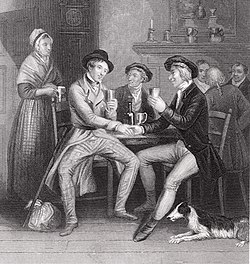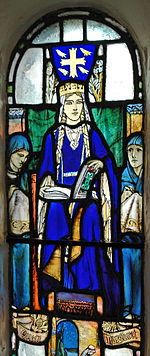| Main Page | Selected articles 1 | Selected articles 2 | Selected biographies | Selected quotes | Selected pictures | Featured Content | Categories & Topics |
Introduction
 |

|
|

| ||
Scotland (Scots: Scotland; Scottish Gaelic: Alba) is a country that is part of the United Kingdom. It contains nearly one-third of the United Kingdom's land area, consisting of the northern part of the island of Great Britain and more than 790 adjacent islands, principally in the archipelagos of the Hebrides and the Northern Isles. To the south-east, Scotland has its only land border, which is 96 miles (154 km) long and shared with England; the country is surrounded by the Atlantic Ocean to the north and west, the North Sea to the north-east and east, and the Irish Sea to the south. The population in 2022 was 5,439,842 and accounts for 8% of the population of the UK. Edinburgh is the capital and Glasgow is the largest of the cities of Scotland.
The Kingdom of Scotland emerged as an independent sovereign state in the 9th century. In 1603, James VI inherited the Kingdom of England and the Kingdom of Ireland, forming a personal union of the three kingdoms. On 1 May 1707 Scotland and England combined to create the new Kingdom of Great Britain, with the Parliament of Scotland subsumed into the Parliament of Great Britain. In 1999 a Scottish Parliament was re-established, and has devolved authority over many areas of domestic policy. The country has a distinct legal system, educational system, and religious history from the rest of the UK, which have all contributed to the continuation of Scottish culture and national identity. Scottish English and Scots are the most widely spoken languages in the country, existing on a dialect continuum with each other. Scottish Gaelic speakers can be found all over Scotland, however the language is largely spoken natively by communities within the Hebrides. The number of Gaelic speakers numbers less than 2% of the total population, though state-sponsored revitalisation attempts have led to a growing community of second language speakers.
The mainland of Scotland is broadly divided into three regions: the Highlands, a mountainous region in the north and north-west; the Lowlands, a flatter plain across the centre of the country; and the Southern Uplands, a hilly region along the southern border. The Highlands are the most mountainous region of the British Isles and contain its highest peak, Ben Nevis, at 4,413 feet (1,345 m). The region also contains many lakes, called lochs; the term is also applied to the many saltwater inlets along the country's deeply indented western coastline. The geography of the many islands is varied. Some, such as Mull and Skye, are noted for their mountainous terrain, while the likes of Tiree and Coll are much flatter. (Full article...)
Selected article

"Auld Lang Syne" (Scots pronunciation: [ˈɔːl(d) lɑŋ ˈsəi̯n]) is a popular Scottish song, particularly in the English-speaking world. Traditionally, it is sung to bid farewell to the old year at the stroke of midnight on New Year's Eve/Hogmanay. By extension, it is also often heard at funerals, graduations, and as a farewell or ending to other occasions; for instance, many branches of the Scouting movement use it to close jamborees and other functions.
The text is a Scots-language poem written by Robert Burns in 1788 but based on an older Scottish folk song. In 1799, it was set to a traditional tune, which has since become standard. "Auld Lang Syne" is listed as numbers 6294 and 13892 in the Roud Folk Song Index.
The poem's Scots title may be translated into standard English as "old long since" or, less literally, "long long ago", "days gone by", "times long past" or "old times". Consequently, "For auld lang syne", as it appears in the first line of the chorus, might be loosely translated as "for the sake of old times". (Full article...) Read more ...
Selected quotes
" ... You ought to be roasted alive, though even then you would not be to my taste ... "
— J. M. Barrie speaking to George Bernard Shaw
" ... We are often unable to tell people what they need to know because they want to know something else ... "
In the news

- 7 May 2024 – Premiership of John Swinney
- The Scottish Parliament votes to elect John Swinney as First Minister of Scotland with 64 votes in favour and seven abstentions from the Scottish Greens. (BBC News)
- 6 May 2024 – 2024 Scottish National Party leadership election
- John Swinney is elected leader of the Scottish National Party following the resignation of First Minister Humza Yousaf. (The Guardian)
- 4 May 2024 – International reactions to the Israel–Hamas war
- Palestinian doctor and rector at the University of Glasgow Ghassan Abu-Sittah is denied entry into France after landing at Charles de Gaulle airport on his way to speak at the French Senate. Last month, he was denied entry into Germany. (Al Jazeera)
- 1 May 2024 – 2024 Scottish government crisis
- The Scottish National Party administration survives the vote of no confidence earlier this week, prompting the party to seek a replacement for outgoing First Minister Humza Yousaf. (Al Jazeera)
- 29 April 2024 – 2024 Scottish government crisis
- Ahead of a planned vote of no confidence, Scottish First Minister Humza Yousaf announces that he will resign from office. (CNBC) (The New York Times)
- 25 April 2024 – 2024 Scottish government crisis
- Premiership of Humza Yousaf
Selected biography

James Curran Baxter (29 September 1939 – 14 April 2001) was a Scottish professional footballer who played as a left half. He is generally regarded as one of the country's greatest ever players. He was born, educated and started his career in Fife, but his peak playing years were in the early 1960s with the Glasgow club Rangers, whom he helped to win ten trophies between 1960 and 1965, and where he became known as "Slim Jim". However, he started drinking heavily during a four-month layoff caused by a leg fracture in December 1964, his fitness suffered, and he was transferred to Sunderland in summer 1965. In two and a half years at Sunderland he played 98 games and scored 12 goals, becoming known for drinking himself unconscious the night before a match and playing well the next day. At the end of 1967 Sunderland transferred him to Nottingham Forest, who gave him a free transfer back to Rangers in 1969 after 50 games. After a further year with Rangers Baxter retired from football in 1970, at the age of 31.
From 1960 to 1967, he was a leading member of a strong Scottish international team that lost only once to England, in 1966, shortly after he recovered from the leg fracture. He thought his best international performance was a 2–1 win against England in 1963, when he scored both goals after Scotland were reduced to 10 players. In the 1967 match against England, who had won the 1966 World Cup, he taunted the opposition by ball juggling while waiting for his teammates to find good positions. Although he was given most of the credit for the 3–2 win, some commentators wished he had made an effort to run up a bigger score.
Selected picture
St Margaret's Chapel, at Edinburgh Castle, is the oldest surviving building in Edinburgh. An example of Romanesque architecture, it is a Category A listed building. Legend had it that St. Margaret worshipped in this small chapel, but recent research indicates that it was built at the beginning of the 12th century by her fourth son who became King David I in 1124
Photo credit: Kjetilbjornsrud
Did You Know...

- ... that contrary to Shakespeare's play, Macbeth was not killed during the Battle of Dunsinane?
- ... that visitors to Balmaclellan in Scotland can stay in a historic watermill that is "remarkable" for the preservation of its internal workings?
- ... that former Scottish Conservative leader Ruth Davidson said that she would swim in Loch Ness naked if the SNP won more than 50 seats at the 2019 United Kingdom general election?
- ... that George Parks was president of the Royal College of Surgeons in Ireland and his son Rowan Parks became president of the Royal College of Surgeons of Edinburgh?
- ... that despite his defeat at the battle of Pitgaveny, both of Duncan's sons would later rule Scotland?
- ... that today the Bishop of Edinburgh plays a ceremonial role at the coronation of Charles III and Camilla as a representative of the Walker Trustees?
- ... that because of violent reactions – such as Jenny Geddes's on 23 July 1637 – to a Scottish prayer book, Walter Whitford kept loaded pistols visible to his congregants while using the book?
- ... that Colin Mackay, the political editor at Scottish Television, was "very sad" when Colin MacKay, the political editor at Scottish Television, died?
Get involved
For editor resources and to collaborate with other editors on improving Wikipedia's Scotland-related articles, see WikiProject Scotland.
To get involved in helping to improve Wikipedia's Scotland related content, please consider doing some of the following tasks or joining one or more of the associated Wikiprojects:
- Visit the Scottish Wikipedians' notice board and help to write new Scotland-related articles, and expand and improve existing ones.
- Visit Wikipedia:WikiProject Scotland/Assessment, and help out by assessing unrated Scottish articles.
- Add the Project Banner to Scottish articles around Wikipedia.
- Participate in WikiProject Scotland's Peer Review, including responding to PR requests and nominating Scottish articles.
- Help nominate and select new content for the Scotland portal.
Do you have a question about The Scotland Portal that you can't find the answer to?
Post a question on the Talk Page or consider asking it at the Wikipedia reference desk.
Related portals
Other language versions
Associated Wikimedia
The following Wikimedia Foundation sister projects provide more on this subject:
-
Commons
Free media repository -
Wikibooks
Free textbooks and manuals -
Wikidata
Free knowledge base -
Wikinews
Free-content news -
Wikiquote
Collection of quotations -
Wikisource
Free-content library -
Wikispecies
Directory of species -
Wikiversity
Free learning tools -
Wikivoyage
Free travel guide -
Wiktionary
Dictionary and thesaurus






































